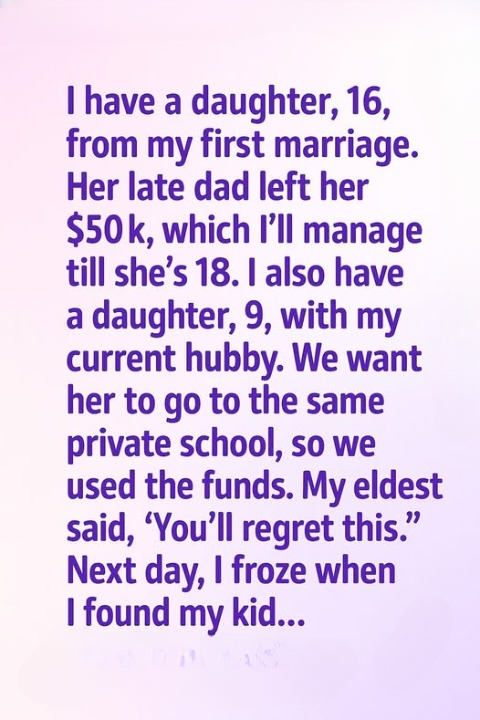The Mistake That Shattered Trust
I have a 16-year-old daughter from my first marriage. Her late father, a man devoted to her life, left her $50,000 when he passed—a legacy meant to carry her safely into adulthood. I managed that money carefully, always planning for it to be hers when she turned 18, a cushion for her future.
Then, my husband and I had a second daughter, a lively 9-year-old. When she expressed a desire to attend the same private school her older sister had gone to, we faced a dilemma. Tuition, bills, and mounting expenses made the decision complicated. In a moment we thought was fair, we took some of the money left by my eldest’s father to fund our youngest’s schooling.
When my oldest found out, her reaction was immediate and intense. Her eyes burned with anger as she said, “You’ll regret this.” I dismissed it at first as teenage dramatics, but deep down, I knew it was more.
The next morning, the truth hit me harder than I ever imagined. I walked into the living room and found her sitting quietly on the couch, a packed suitcase beside her. Her eyes were swollen, her voice barely a whisper as she said, “Mom, I don’t feel like this is my home anymore.”
In that moment, my heart shattered. The money wasn’t just cash—it was her father’s love, his hope for her future, his care for her. By spending it, I had inadvertently taken something far deeper: a tangible connection to the man she had loved and lost.
I sat beside her, took her trembling hands, and whispered apologies through my tears. I explained that I’d acted thinking I was doing the right thing, but now I understood the hurt I had caused. Hours passed as we talked, cried, and shared memories of her father, the money, and the bond she feared had been broken. By evening, the raw pain began to soften, replaced by tentative understanding.
I spoke to my husband, and we knew we had to make amends. Every cent taken from her father’s legacy would be repaid, no matter the sacrifices required. It wasn’t about money—it was about restoring trust and showing her that her feelings mattered.
Healing has been slow. Trust doesn’t rebuild overnight, and I may never undo the sting of that moment. But I see signs of hope: small smiles, tentative conversations, a willingness to reconnect. I am committed to doing everything I can to repair the bond.
This experience has taught me a profound lesson: love isn’t about equal treatment in every circumstance. It’s about understanding the nuances of each child’s heart, honoring their feelings, and creating space for them to be heard. Sometimes the most valuable gift isn’t material—it’s empathy, attention, and the security of knowing you are seen and understood. That, I’ve realized, is what truly makes a house a home, and mends the cracks in a family’s heart.
